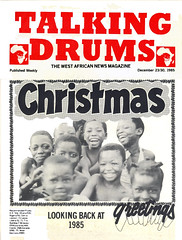PNDC bans Catholic Standard
STANDARD
NATIONAL CATHOLIC WEEKLY
PRICE C5.00
The Ministry of Information has with immediate effect revoked the registration of the Catholic Standard'. In a statement on 13th December it explained that for some time now, the 'Catholic Standard' has been writing in a manner that clearly jeopardises the national interest. The Ministry notes that at a time when all efforts are being made to concentrate attention on national recovery and unity, the Standard', on the contrary, has shown itself to be unpatriotic and determined to use its pages to undermine that noble course.The Ministry is of the view that the 'Standard', which is owned by a religious body, should preach truth and love, and urge the country to strive for economic development as a condition for saving souls, rather than under- mine the people's confidence in themselves and in their future.
The Ministry said it has shown tolerance in the face of possible misinterpretation of any action as an attempt to prevent criticism, the statement said. After serious consideration of the issue, however, the Ministry has decided to take this decisive step to halt the campaign of slander and misinformation, and the deliberate and mischievous activities of the 'Standard' and certain individuals using it as a religious pulpit to cover their political intentions. The Ministry repeated that there is respect for religious freedom.
The Catholic Standard, established forty seven years ago is published weekly by the Standard Newspapers and Magazines Limited. Its current acting editor is FR. Charles Palmer-Buckle.
Registered with the General Post Office as a newspaper, the standard has played the noble role of reporting and commenting on matters both temporal and spiritual.
In an atmosphere of a docile press, the Catholic Standard and the Free Press, another weekly have become the only source of authentic information in the country.
Recently when the chairman of the PNDC, Flt-Lt Rawlings poured vituperations on the Catholic Bishop of Kumasi, Bishop Akwasi Sarpong in a television appearance, following the expulsion from the Kumasi Diocese of two Dutch missionaries who are members of a left wing grouping on the political scene, the Stan- dard was the only paper that afforded the venerable bishop an opportunity to let the public into the other side of the conflict. The paper's campaign to highlight instances of injustices in the Ghanaian society led to the publication of a list of Ghanaians who have been incarcerated without specific charges since the advent of the PNDC. It also reported the extreme hardships that have been put in the way of parents who have to pay high fees to be able to send their children to schools.
The letters page of the paper serves as a forum for the airing of the aspirations and genuine fears of the Ghanaian about the state of the nation's affairs under the PNDC..
These are a few characteristics which usually place the paper on the forefront of the struggle against human rights abuses, and other forms of injustices in Ghana.
No doubt previous governments felt uneasy at the strident journalistic role of the Standard but the PNDC banning decision reflects the regime's determination to pursue its rampant abuse of human rights without the risk of being criticised by the Catholic Standard.
We reproduce here just the first paragraph of a typical editorial of the paper to show why it irks the PNDC: "At the beginning of the Revolution we were promised that all citizens would be given the opportunity to participate directly in the taking of decisions affecting the destiny of this country. After three and a half years, there is not much evidence of this 'participatory decision-making' especially on economic measures that directly affect each one of us".
(July 28, 1985)
